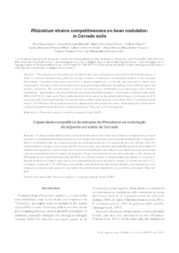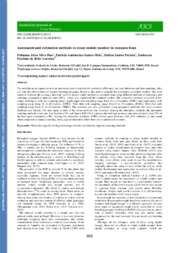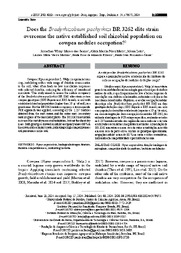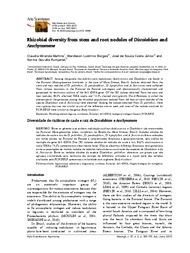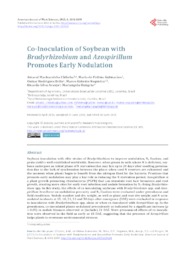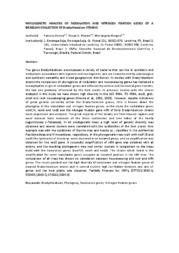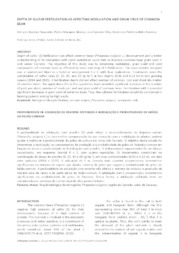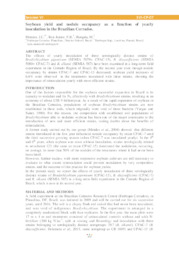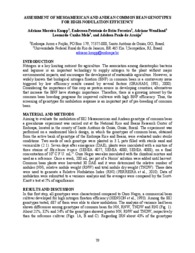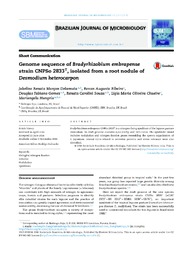Search Publications
Filter by:
| Author(s): RAPOSEIRAS, R.; MARRIEL, I. E.; MUZZI, M. R. S; PAIVA, E.; PEREIRA FILHO, I. A.; CARVALHAIS, L. C.; PASSOS, R. V. M.; PINTO, P. P.; SÁ, N. M. H. de ABSTRACT: The objective of this work was to identify the most competitive and effective Rhizobium strains in order to increase common bean yield by nitrogen fixation as alternative or complementation... ... |
| Author(s): DIAS, P. A. S.; MELO, P. G. S.; PEREIRA, H. S.; FERREIRA, E. P. de B. The nodulation on legume roots is an important trait to evaluate the symbiotic efficiency, but very laborious and time spending, what can limit the effectiveness of legume breeding programs. Based on... ... |
| Author(s): SANTOS, J. W. M. dos; PÉREZ MARIN, A. M.; LEITE, J.; MARTINS, L. M. V.; RIBEIRO, P. R. de A.; FERNANDES JUNIOR, P. I. Cowpea (Vigna unguiculata L. Walp.) is a promiscuous crop, nodulating with a wide range of rhizobia strains native to the soil, what often leads to low inoculation responses with selected rhizobia, re... ... |
| Author(s): MARTINS, C. M.; BORGES, W. L.; COSTA JÚNIOR, J. de S.; RUMJANEK, N. G. Among the genera that exhibit stem nodulation, Aeschynomeneand Discolobiumare found in the Pantanal Mato-grossense (wetlands in the state ofMato Grosso, Brazil). Isolates obtained from the stem and ro... ... |
| Author(s): CHIBEBA, A. M.; GUIMARÃES, M. de F.; BRITO, O. R.; NOGUEIRA, M. A.; ARAUJO, R. S.; HUNGRIA, M. Soybean inoculation with elite strains of Bradyrhizobium to improve nodulation, N2 fixation, and grain yield is well established worldwide. However, when grown in soils where N is deficient, soybean u... ... |
| Author(s): MENNA, P.; RIBEIRO, R. A.; HUNGRIA, M. The genus Bradyrhizobium encompasses a variety of bacteria that can live in symbiotic and endophytic associations with legumes and non-legumes, and are characterized by physiological and symbiotic ver... ... |
| Author(s): NASCENTE, A. S.; SILVEIRA, P. M.; SILVA, J. G.; FERREIRA, E. P. B. Depth of sulfur (S) fertilization can affect common bean (Phaseolus vulgaris L.) development and a better understanding of its interaction with plant nodulation could help to improve common bean grain... ... |
| Author(s): MENDES, I. de C.; REIS JUNIOR, F. B. dos; HUNGRIA, M. The effects of yearly inoculation of three serologically distinct strains of Bradyrhizobium japonicum (SEMIA 5079= CPAC-15), B. diazoefficiens (SEMIA 5080= CPAC-7) and B. elkanii (SEMIA 587) have been... ... |
| Author(s): KNUPP, A. M.; FERREIRA, E. P. de B.; WENDLAND, A.; MELO, L. C.; ARAÚJO, A. P. de Nitrogen is a key limiting nutrient for agriculture. The association among diazotrophic bacteria and legumes is an important technology to supply nitrogen to the plant without major environmental impa... ... |
| Author(s): DELAMUTA, J. R. M.; RIBEIRO, R. A.; GOMES, D. F.; SOUZA, R. C.; CHUEIRE, L. M. O.; HUNGRIA, M.
|
Observation
Some of Embrapa's publications are published as ePub files. To read them, use or download one of the following free software options to your computer or mobile device. Android: Google Play Books; IOS: iBooks; Windows and Linux: Calibre.
Access other publications
Access the Agricultural Research Database (BDPA) to consult Embrapa's full library collection and records.
Visit Embrapa Bookstore to purchase books and other publications sold by Embrapa.

